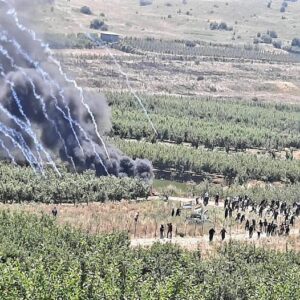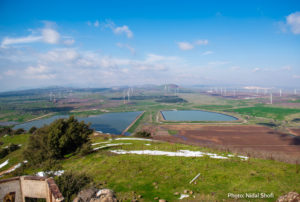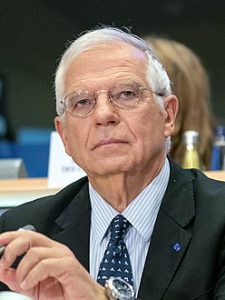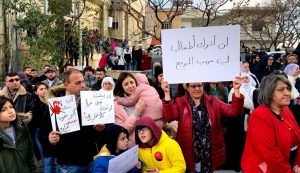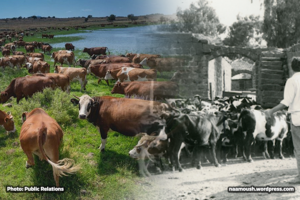
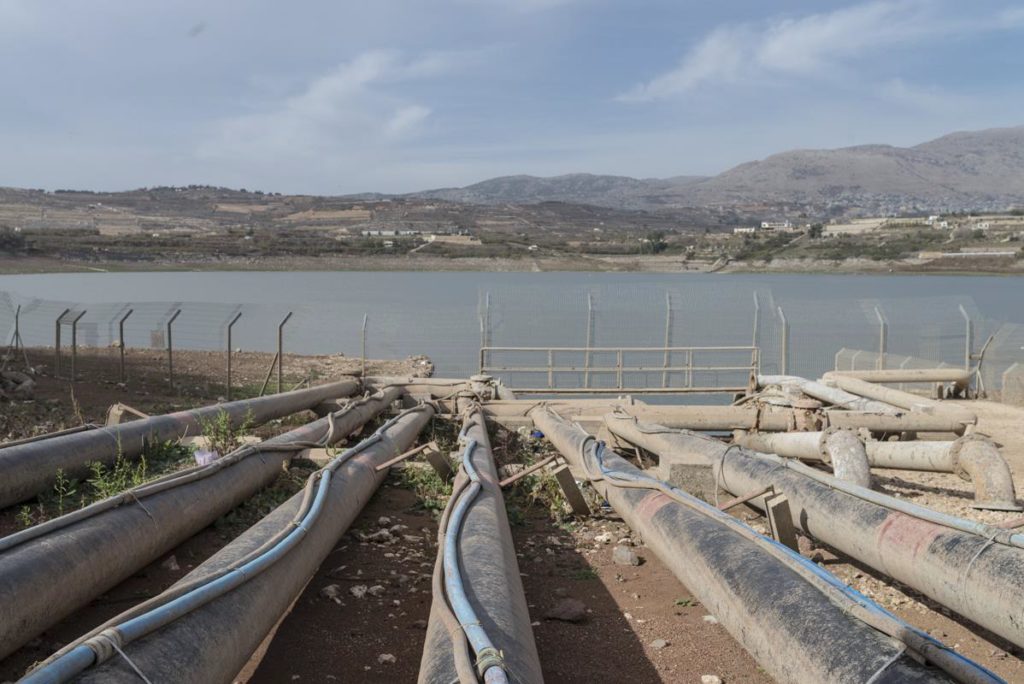
Since occupying the Syrian Golan (‘Golan’), Israel has progressively consolidated its power over the region’s natural resources, treating them as if they are within Israel’s sovereign control. To date, Israel has expropriated over 95 percent of the available land under its control while refusing to acknowledge the vast majority of Syrian public or private ownership. Israel’s natural resource exploitation in the Golan includes appropriation of wind, oil and water resources.
Wind
Under the cloak of pursuing sustainable, clean energy goals, Israel continues to attempt to illegally extend its jurisdiction into Golan by launching renewable energy projects. Simultaneously, Syrians are denied access to their natural resources and territory while being forced into permanent energy dependence on Israel through the creation of captive economies. Out of Israel’s numerous wind and solar energy projects in the Golan, the Clean Wind Energy Project will have the most dramatic impact on Syrians’ health and environment.
The company behind the project is Energix Renewable Energies Ltd. (‘Energix’), which is incorporated and traded on Israel’s main stock exchange. Despite countless objections from the Syrian population, Energix obtained approval from the Israeli government in January 2020 to build 25 wind turbines¹ on Syrian agricultural land adjacent to three of the remaining Syrian villages in the Golan. With a maximum height of 220m, the approved turbines could be some of the tallest onshore turbines in the world and would occupy around a fifth of the agricultural land in the Golan still available to Syrians. In addition to violating international law, Energix’s wind energy project has been marked by a strategy to manipulate and intimidate the Syrian population. This culminated in Energix suing Al-Marsad and members of the Syrian population under Israel’s controversial ‘Anti-Boycott Act’ in 2019 in an attempt to silence the organisation and others who expressed concerns about the project’s legality and impact on the Syrian population. The case against Al-Marsad is ongoing. Given the gravity of the situation, the UN Special Rapporteurs on the Situation of Human Rights Defenders; Issue of Human Rights Obligations Relating to the Enjoyment of a Safe, Clean, Healthy and Sustainable Environment; and, the Promotion and Protection of the Right to Freedom of Opinion and Expression wrote to the Israeli government and Energix in early 2020.
In a 12-page letter, the Special Rapporteurs outline their legal concerns with Energix’s project and lawsuits, asking for more information and clarification on nine key issues. The Israeli government responded in March 2020, failing to meaningfully address any of the legal issues that the Special Rapporteurs raised. Israel does not dispute any of the facts in the letter, which implicate various violations of international law, and continues to defend its universally condemned ‘Anti-Boycott Law’ as it is used to supress human rights work. Meanwhile, in Spring 2020 Energix was taking advantage of the COVID-19 lockdown in the Golan to develop sites for its harmful wind farm project.
Accompanied by Israeli police, Energix representatives are visiting project sites to demarcate plots and erect signs. Meanwhile, due to COVID-19 movement restrictions, Golani Syrians are grounded in their homes, unable to monitor or peacefully protest Energix’s activities. Those that have risked their health to venture out and film Energix and Israeli police visits to project sites have subsequently been harassed and questioned by police. On February 8, 2022, Energix obtained permits to start implementing the project, but the Syrian population is still making efforts to challenge the legality of these permits – through a lawsuit that receives legal support from Al-Marsad – and they continue their struggle to prevent the implementation of this disastrous project.
Water
According to the World Resources Institute in 2040 Israel is going to be the eighth most water stressed country in the world. Meanwhile, the Golan receives a much higher level of rainfall than much of Israel, and currently supplies Israel with a significant amount of its annual water consumption. It is therefore no surprise that in 1995, former Israeli Prime Minister Yitzhak Rabin stated that ‘the greatest danger Israel has to face in the negotiations with Syria is the possibility of losing control over the Golan Heights’ water resources.
Within the framework of settling the newly occupied territories and after the seizure of the Syrian land, the Israeli occupation authorities have established water complexes / reservoirs in the occupied Golan since 1968. The motivating goal was to provide the crucial infrastructure for establishing the settler-colonial entities, where irrigated agriculture is the main component of the settlements’ economies.
Toward the end of 2021, the occupation authorities had already built sixteen (16) water complexes in the occupied Golan. These reservoirs are filled with surface water, torrential water and streams’ water during the winter by connecting them to natural water channels and channels specially dug for this purpose. The total capacity of these complexes is 45.0 million m³.
In addition to exploiting the Golan’s water resources, Israel has implemented discriminatory water policies towards the Syrian population, charging them higher prices for water and setting them lower quotas for the amount of water they are allowed to buy. Israeli settlers, whose inhabitancy of the Golan is illegal, enjoy unmeasured access to the water, while the Syrian population, and rightful owners of the land, experience significant restrictions. In addition, the few local springs that Israel has continued to allow Syrian farmers access to, have been drying up as a result of the drilling activities and water extraction carried out by Israeli companies and Israeli authorities. Israel’s exploitation of water inhibits native Syrians’ ability to sustain an agricultural economy.
Today, agriculture is no longer profitable because the cost of water is too high. Meanwhile, Israel capitalizes on the water it siphons from the Golan to produce many of Israel’s top-rated wines and a significant quantity of Israel’s fruits and vegetables on the land it has confiscated. Israel also uses water acquired from the Golan to irrigate its settlements via Israel’s National Water Carrier Pipeline. Israel’s monopoly over the extracted water generates substantial profits. Israeli companies, like Eden Springs, proudly advertise their water as flowing from “the beautiful and natural waterfall at the heart of the Golan Heights.”
Oil and Gas
Since the outbreak of the Syrian conflict in 2011, Israel has advanced gas and oil exploration in the Golan. Israel issued its first license to drill exploratory wells for gas and oil reserves in 2013 to an Israeli company, Afek Oil and Gas (‘Afek’), a subsidiary of Genie Energy, a massive United States-based energy corporation linked to Dick Cheney and Rupert Murdoch. Afek claims that the Golan contains ‘billions of barrels of Israeli oil’ and that the oil ‘is expected to enrich [Israel’s] coffers in the amount of at least 5 billion shekels a year’. Afek’s drilling license covered the majority of the southern half of the Golan, where it dug 10 wells before halting drilling activities in 2017.
Although Afek has paused its drilling, it remains optimistic about large oil reserves in the Golan and is still actively seeking licenses in the region. Drilling for oil for private gain in occupied territory is a clear violation of international law. Further, the Syrian population will not benefit from any oil sales from the region even though it is the rightful owner of the land. There will also be environmental consequences: Afek can use fracking to release the oil and gas, which might cause small earthquakes and contaminate groundwater. Oil drilling can also cause air pollution and the release of harmful chemicals.
Many Syrians in the Golan are not even aware that the oil drilling is taking place. Syrians live in the five small remaining villages in the north of the Golan, whereas the drilling is taking place in the south. This makes it easier for Afek to carry out its operations. However, the impact of oil exploitation will affect the Syrian population: it is a violation of international law, it will damage the environment and it is essentially stealing natural resources from the rightful owners of the land, the Syrian people.

